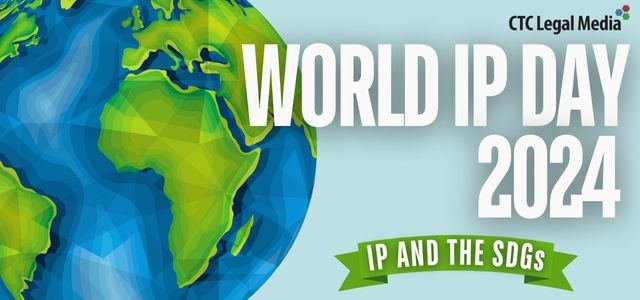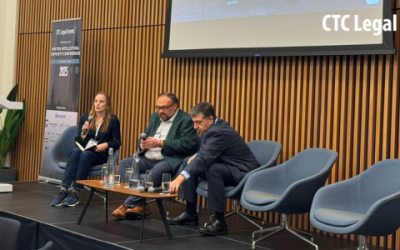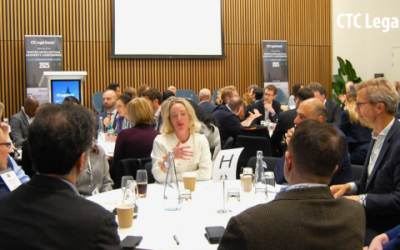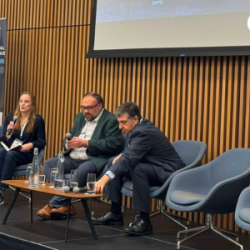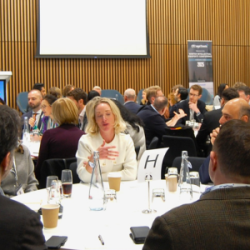As World Intellectual Property Day approaches on 26 April, we asked our Editorial Board their thoughts on this year’s focus: ‘IP and the SDGs: Building our common future with innovation and creativity.’
Established by the United Nations in 2015, the Sustainable Development Goals (SDGs) are 17 global goals intended to create a better world by 2030 by addressing issues related to poverty, inequality, and climate change. The role of IP is vital in reaching these goals, with innovation and creative solutions a driving force towards a more sustainable future.
Our Editorial Board share their thoughts:
“With an increasing focus on sustainability, and evolving compliance requirements for governments, policy-makers, and businesses, it is timely that World IP Day 2024’s theme shines the spotlight on the positive role that IP rights may play in creating a better future for us all. Many of the UN’s 17 Sustainable Development Goals (SDGs) – notably clean water and sanitation, affordable and clean energy, sustainable cities and communities, and climate action – will require innovative solutions and new technologies to implement. Over the past 20 years, growth in green technology innovation has surpassed that in so-called brown technologies (i.e., fossil fuels). The availability of IP to protect the rights of inventors and creators will continue to incentivize research and development and encourage investment in innovative technologies that will be pivotal in working towards the SDGs.
“From a UK perspective, a recent UK Intellectual Property Office (UKIPO) report demonstrated an uptick in patent applications made via the UKIPO’s ‘Green Channel’ which offers accelerated patent processing for inventions with an environmental benefit. The information provided by such data will help UK policymakers understand where innovation is focused, providing evidence for governmental strategies, as well as assisting businesses to appraise their investments. However, such policies cannot be limited to individual countries. Green technology innovation, supported by IP rights, must take place on a global basis for the SDGs to be successfully met.”
Sarah Taylor, Senior Practice, Development Lawyer, Pinsent Masons’ IP practice, The Patent Lawyer Editorial Board Member
“In celebration of World IP Day 2024, I want to recognize the pivotal role of IP in enriching and sustaining the tourism industry. IP serves as the cornerstone for protecting and enhancing the unique identities of destinations and services through trademarks, which foster trust and consistency among tourists globally. Copyrights play a crucial role in preserving local cultures, allowing for the respectful commercialization of cultural expressions while contributing to local economies. Innovations in tourism, protected by patents, pave the way for advanced, sustainable travel experiences. Meanwhile, industrial designs add aesthetic value and distinctiveness to tourist offerings.
However, the essence of IP in sustainable tourism is not just in protection but in fostering respectful collaboration and education. Engaging local (indigenous) communities, acknowledging the origins of cultural elements, and ensuring fair practices are vital. On World IP Day, let’s commit to balancing IP protection with ethical, sustainable tourism practices. Doing so not only upholds the integrity of local cultures but also ensures the long-term viability and vibrancy of the tourism industry.”
Mark Bloom, CLP®, RTTP™, NSABP Foundation, Inc., The Patent Lawyer Editorial Board Member
“According to WIPO, 31.4% of all active patent families in the world relate to the UN SDGs. This indicates that IP, especially patents, definitely contribute greatly to the development of SDG-related technologies for improving our collective future.
“Japan has been contributing as one of the leading countries as an originating country of SDG-related inventions. Electrical and chemical fields are the main areas of SDG-related inventions. In the electrical field, Toyota Motor Corporation leads in the number of applications for SDG-related inventions, while Panasonic, Honda Motors, Denso, Mitsubishi Electric, and others have filed a significant number of SDG-related patent applications.
“In the chemical field, technologies are developing significantly in pharmaceuticals, food chemistry, biotechnology, clean water and sanitation, and emission reduction. One example is Unicharm, which has excellent technology in the field of daily personal care products.
“As in other countries, patents in Japan are contributing greatly to the development of SDG-related technologies that will improve our future.”
Osamu Yamamoto, Partner, Yuasa & Hara, The Patent Lawyer Editorial Board Member
“Many innovators in the cleantech space rely on IP to help recoup the cost of R&D to make their inventions. Some IP Offices are currently playing a role in facilitating IP protection by prioritizing climate-related technologies for patent examination. For example, in Canada, we have advanced examinations available for green technology patent applications. This prioritizes the examination of a technology that, if commercialized, would help resolve or mitigate environmental impacts or conserve the natural environment or natural resources. Some other patent offices will also do an expedited review of green tech patent applications. Many would welcome this practice becoming more widespread, as well as being applied to other types of IP, such as trademarks. Not all cleantech companies want to expedite their IP. However, if it will help their business to attract investment or enforce their IP rights, then let’s give them, and the environment, that small amount of extra support.”
Noel Courage, Partner, Bereskin & Parr, The Patent Lawyer Editorial Board Member
“Intellectual property rights (IPR) are pivotal in shaping our shared future and advancing the United Nations’ Sustainable Development Goals (SDGs). For instance, SDG 4 aims to ensure inclusive and equitable high-quality education and promote lifelong learning opportunities for everyone. However, in remote regions, accessing education remains a major hurdle. Here, the role of fast and reliable connectivity, notably through 4G and 5G cellular technologies, becomes crucial. These technologies emerge from substantial research and development investments, protected by patents. Yet, such patents essential to cellular standards are generally accessible under fair, reasonable, and non-discriminatory (FRAND) terms. This accessibility enables the deployment of affordable, high-quality educational resources in isolated areas, thereby promoting universal access to education and, step by step, fulfilling the promise of SDG 4.”
Dr. Claudia Tapia, Director IPR Policy and Legal Academic Research, Ericsson, The Patent Lawyer Editorial Board Member
Anand & Anand’s commitment to furthering sustainability through their firm’s actions highlights the role that IP has in achieving SDGs:
“In terms of advancing healthcare, our firm acts for Roche in a rare disease case, where the court intervened between the government and victims, mostly children, to increase the accessibility of highly-priced medicines.
“In the Eli Lilly case, we assisted in the execution of Voluntary Licenses to several parties for the supply of drugs during COVID-19.
“To advance environmental issues, we persuaded the court to punish a defendant in a pharmaceutical patent matter of Merck, to plant 140,000 trees in the central ridge area of Delhi with the plaintiff getting Corporate Social Responsibility (CSR) benefits and the public gaining anti-pollution measures.
“In the field of education, apart from donating IP books to several Law Colleges in India, we recently donated books to the Jigme Singhye Wangchuck School of Law in Bhutan and developed an interactive hologram to inspire school and college students on Indian Scientists and, in particular, the Nobel Laureate Sir CV Raman.
“Regarding clean water and sanitation, in the Hermes order, the defendant was ordered to donate water coolers to schools in Delhi so that children could get clean and cold water during the hot summer months.”
Pravin Anand, Managing Partner, Anand & Anand, The Patent Lawyer Editorial Board Member
You may also like…
David Jenkins of UKIPO shares his thoughts on the Winter Intellectual Property Conference 2025
Following CTC Legal Events' second Winter Intellectual Property Conference held in London on 5-6 November, David...
Winter Intellectual Property Conference 2025: a review
As a proud member of the Editorial Board of The Trademark Lawyer, I could not decline the invitation of the...
Pravin Anand conferred with the APAA Enduring Impact Award
Pre-eminent IP Lawyer and Managing Partner of Anand and Anand, Mr Pravin Anand, has been conferred with the...
Contact us to write for out Newsletter


